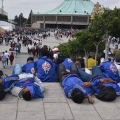At the crossroads between La Revolta and Martagona (Melide), pilgrims walking the Primitive Way stumble upon a plaque bearing Article 24 of the Universal Declaration of Human Rights:
“Everyone has the right to rest and leisure, including reasonable limitation of working hours and periodic holidays with pay.”
“How timely,” pilgrims might think. Indeed, most people go on pilgrimages to get away from the stress of everyday life while enjoying a few days of paid vacation.
Twenty forth article of the Universal Declaration of Human Rights
But what might seem a self-evident truth for some is not a universally accepted fact –nor has it always been so throughout history. The right to rest was just officially recognized as such after much struggle as recently as in the 20th century. Nevertheless, all religious traditions throughout the world have historically asserted the human necessity of rest.
In Judaism, the right to rest is deeply rooted in the observance of the Shabbat, the weekly day of rest mandated in Leviticus. The fourth commandment is quite explicit: “Remember the Sabbath day to keep it holy.”
The Torah states, “Six days you shall labor and do all your work, but the seventh day is a Sabbath to the Lord your God” (Exodus 20, 8-10).
The specific instructions regulating Shabbat (such as the prohibition of work and the encouragement of family and community activities) are designed to create a space set apart from the pressures of daily life.
Sunday
Christianity moved the weekly day of rest from Saturday to Sunday, commemorating the resurrection of Jesus. Although Jesus did not explicitly establish a “right to rest,” some of his teachings stress the importance of rest and restoration.
In Mark 6, 31, Jesus invites his disciples to rest. “Come, come away to a secluded location to repose for a period of time.” In Matthew 11, 28 he offers rest to those who are burdened. “Come to me, all who labor and are heavy laden, and I will give you rest.”
Making Sunday a day of rest and worship signified a shift in the balance between work and spiritual life. This tradition has influenced labor regulations in numerous Western countries, which have designated Sunday as an official day of rest, underscoring the necessity for time off for holistic well-being.
The Tawazun
Although no weekly day of rest is specified, Islamic principles do emphasize the importance of work-life balance.
The concept of tawazun (translatable as “balance”) and the teachings of the Prophet Muhammad promote a holistic approach to wellness that includes adequate rest. The five daily prayers, distributed throughout the day, provide natural (and necessary) breaks that allow believers to rest and gather their psychic and spiritual strengths.
Furthermore, Islamic teachings prohibit the exploitation of labor and demand that workers be treated fairly, with adequate time for relaxation and recreation. This perspective has influenced the promotion of fair working conditions and the recognition of rest as an essential component of human dignity and social justice.
Samatha
Although Buddhism does not explicitly define a “right to rest,” its practices and teachings do stress the importance of rest for physical, mental, and spiritual well-being. The Noble Eightfold Path, a fundamental pillar of Buddhism, includes the concepts of “right effort” and “mindfulness” one next to the other, which promote a balance between activity and rest.
Meditation and the concept of samatha (mental stillness, or simply “calm”) are essential for achieving a state of tranquility and psychological clarity –thus implying the need for adequate repose.
The significance of rest in Buddhism is exemplified by the practice of spiritual retreats, which permit practitioners to engage in meditation and repose, thereby fostering spiritual and mental renewal. These principles have influenced the understanding of rest as a necessity for holistic health and well-being.
The Hindu tradition, with its rich spiritual heritage, also places great value on rest as an essential component of a balanced lifestyle. Yoga and meditation are central to Hindu life, offering different methods to release tensions and achieve relaxation.
Religious holidays, feasts, and days of spiritual observance provide opportunities for rest and reflection, thereby underscoring the significance of disengaging from worldly activities. The world’s great religious and cultural traditions have played a pivotal role in the conceptualization of the right to rest. All of these traditions underscore the significance of rest for the attainment of general well-being.
These teachings and practices have significantly influenced the recognition of rest as a fundamental human right, essential for the maintenance of dignity, health, and social justice. In an era of accelerating globalization and relentless technological advancement, the right to rest remains a fundamental tenet for the construction of just and balanced societies.





